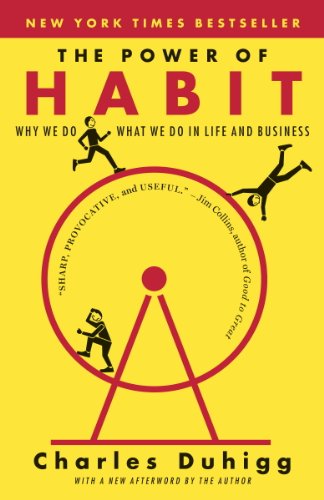Should we just accept that it’s fate to spend a life on the couch, snacking on a family size bag of Doritos with no hope of ever sticking to a healthy lifestyle? Or accept that we’re never going to reach our body weight goal because we can’t dedicate the time to go to the gym regularly?
We should not set ourselves to such low expectations.
People often disregard new habits because they have experimented with them before. These individuals told themselves that they would do something and ended up not sticking to their plan.
Dieting came to a halt, projects went on pause, and hobbies such as yoga, reading, and writing became non-existent. They told themselves that they were going to eat healthier, but life just got in the way.
All these individuals share one thing in common: they don’t know how to stick to a new habit.
And they don’t even realize what they’re doing is wrong. Often, there are multiple reasons why they’re not able to maintain a new habit.
Welcome to Snapreads! Today, we’re bringing you the seven most common reasons people don’t stick with new habits! Once you have identified the reasons, you’ll be able to get that desired lifestyle you always wanted.

The Power of Habit
by Charles Duhigg
⏱ 15 minutes reading time
🎧 Audio version available
They Rationalise and Renegotiate
The first reason is one that will resonate with everyone. When it comes to sticking to a new habit, we tend to rationalize. When something gets difficult or there’s a temptation to do something else to skip in favor of another action, that’s more tempting.
Our minds immediately start rationalizing why it’s okay to temporarily abandon that habit and do what we said we weren’t going to do.
These thoughts can manifest in the form of “It’s a special occasion, so this is an exception” or “Just one time won’t hurt,” or it can even be rationalizing breaking a habit by saying that “You deserve this after working so hard.”
At the moment, these thoughts sound incredibly rational, but what they do is sabotage us. Once we start to believe and act upon these rationalizations, sticking to anything at all is near impossible.
After rationalization, we tend to renegotiate. Renegotiate, as in procrastinating. You had the mindset to start something but end up doing something the total opposite. Renegotiating because you’re too tired and have persuaded yourself that whatever it is can be put off tomorrow.
Did you know that rationalization and renegotiation are just other habits? They’re bad ones, and these are the ones we don’t want to keep around.
They Don’t Change Their Environment
You know how they say, “if you sit in a barbershop for long enough, you’ll end up getting a haircut?” The same goes for new habits. People expect to completely reshape their lives but not change a single thing about their surroundings.
Environmental triggers dramatically hold people back from sticking to those new habits. Junk food in the cabinet leads to you breaking your promise to eat healthier. Your phone always buzzing with notifications leads to your breaking that promise to stay offline.
They Start Too Many Habits At Once
You have this vision of being your best self starting from tomorrow. Your best self wakes up early in the morning, exercises, eats healthily, mediates, and goes to work to achieve goals. This right here is when maintaining a new habit goes out the door.
It’s wonderful that people get so inspired and excited to improve upon themselves, but taking on and planning to stick to too numerous habits means it’s not likely a single one will stick. It’s a recipe for feeling overwhelmed and permitting yourself to quit once you fail.
It’s best to start with one or two habits maximum so that you can genuinely sense the difference those habits have on your life. You want to examine how these new habits affect your ability to manage your time wisely. This will cause a ripple effect that can help you form future habits.
The same also applies to starting with a habit that is too big. Setting an unrealistic goal doesn’t mean you’ll be able to achieve it.
They Want a Result, Not a Ritual
We focus nearly every habit and goal are on some result, and that’s not bad. What’s redundant is people focusing on the outcome and not the actual ritual and behavior. It’s natural to be goal-oriented, but here’s the crossroad: new goals don’t deliver new results.
The only thing that’s going to deliver good results is a new lifestyle, and a lifestyle isn’t an outcome; it’s a process and a ritual. And that’s what most people fail to comprehend. Instead of chasing better results, you should direct your energy to build better habits.
We used the word “ritual” because rituals turn behaviors into habits.
Related: How To Break Bad Habits (Once and For All)
They Don’t Have Time
The third most common reason people don’t stick to new habits is that they say they don’t have the time. Whenever they think of incorporating a new habit into their time, it’s like their brain automatically shoots down the idea as “who’s got the time?”
But what if we told you generally when you have adequate personal development habits as part of your routine, that helps in buying you more time in your day. It’s not counterintuitive.
If you struggle with focus or self-discipline, then a habit such as exercising or meditations takes a large chunk out of the time you waste struggling to focus.
Discomfort and Uncertainty
It’s human nature to run from discomfort and uncertainty. When that new habit, whether it’s waking up early or meditation and exercise, starts to get uncomfortable, we stop enjoying it, and we start making excuses to put it off.
When we face uncertainty, such as tackling and maintaining a difficult habit, we start finding reasons to put it off until we don’t feel guilty anymore in ignoring it.
But the problem with this is that it’s inevitable that you’re going to experience difficulties in life. And your habits, while uncomfortable sometimes and too hard to stick to, they’re there to improve your life.
You’re falling into another habit of avoidance, of disliking, judging, resenting, and complaining.
This can also relate to people just feeling lazy when they don’t enjoy doing something regularly.
It’s thrilling to think about a new habit and think of the transformation it will give you, but have you ever experienced that excitement turning into feeling like you’re doing a chore?
You still know the benefits of performing that habit, and you still have the will to do it, but laziness starts to persuade your mind that it’s alright to put it off.
What can we do to combat this? If it comes down to it, try not to miss more than two days in a row of the habit. The more days you are absent, the harder it gets to get back to the new routine. And you know what?
When things get hard, you don’t have to be incredibly hard on yourself in return. When you struggle with a habit, try to do a “mini-version” of it. So instead of doing a full workout, five push-ups will do for now. And instead of meditating for 30 minutes, five minutes will do.
Doing these mini versions of your habits helps you stick to that habit and not break the routine. And before you know it, you’re gaining momentum and will probably decide to continue and do the full work.
They Forgot Why It’s Important
And finally, it comes down to this one scarily common reason: people just forget why it’s essential. When they were just starting to take things seriously, a week, a month, six months into it, and they disregard or completely forget why they even started in the first place.
The thoughts that occupy their minds are more like how uncomfortable this new habit is, so they forget its importance. Once we forget the importance, we stop realizing what matters. We stop committing to it and stop having a good reason to push through that discomfort.
The moment you stop taking things seriously is when your determination is diminished, and then temptation comes into the picture. Out of habit, we give in to temptation.
But in any case, there is always going to be some form of temptation around us. There’s still going to be chocolate when we’re trying to maintain a healthy diet; there’s always going to be something interesting happening on TV when we say we’re going to sleep early. But the worst temptation of all is the internet and social media.
So think about why you embarked on this journey in the first place. Did you set out to wake up early because you feel exhausted throughout your day? Did you plan to eat healthy because you’re worried about your health? Was meditation part of your plan to become your best self because you felt like you needed the concentration it brings?
What Is Snapreads?

With the Snapreads app, you get the key insights from the best nonfiction books in minutes, not hours or days. Our experts transform these books into quick, memorable, easy-to-understand insights you can read when you have the time or listen to them on the go.


